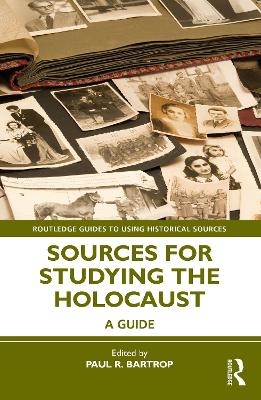
Sources for Studying the Holocaust
Routledge (Verlag)
978-1-032-16450-2 (ISBN)
Sources for Studying the Holocaust provides a pathway for readers to engage with questions about what sources can be used to study the Holocaust.
For many historians, the challenge has been how to rescue the story from oblivion when oft-used sources for other periods of history introduce even more issues around authenticity and reliability. What can be learned of what transpired in villages and towns numbering several thousand people, when all its Jewish inhabitants were totally obliterated through Nazi action? Who can furnish eyewitness testimony, if all the eyewitnesses were killed? How does one examine written records preserving knowledge of facts or events, where none were kept or survived the onslaught? And what weight do we put upon such resources which did manage to endure the destruction wrought by the Holocaust? Each chapter looks at one of a diverse range of source materials from which scholars have rescued the history, including survivor testimony, diaries, letters, newspaper accounts, photographs, trial documents, artefacts, digital resources, memorials, films, literature, and art. Each chapter shows how different types of records can be utilised as accurate sources for the writing of Holocaust history. Collectively, they highlight the ways in which all material, even the most fragmentary, can be employed to recreate a reliable record of what happened during the Holocaust and show how all sources considered can be employed to find meaning and understanding by exploring a range of sources deeply.
This book is a unique analysis of the types of sources that can be used to access the history of Holocaust. It will be of invaluable interest to readers, students, and researchers of the Holocaust.
Paul R. Bartrop is a Professor Emeritus of History at Florida Gulf Coast University, Fort Myers, Florida, and a Principal Fellow in History at the University of Melbourne. He is the author or editor of over 30 books, including the Routledge titles The Routledge History of the Second World War (2022), The Holocaust: The Basics (2019), Genocide: The Basics (2015), Fifty Key Thinkers on the Holocaust and Genocide (2011), and The Genocide Studies Reader (2009).
Introduction Part 1: The Personal Domain 1. Oral History: Hearing the Voice of the Survivors; 2. Letters: An Intimate and Innocent Window into History; 3. Written Remnants of Catastrophe: Holocaust Diaries as Historical Sources; 4. Analysing Memoirs: Gone but Not Forgotten; 5. A Thousand Unspoken Words: Reading Photographs of the Holocaust Part 2: The Public Domain 6. Considering Nazi Propaganda as a Source for Studying the Holocaust; 7. Using Trial Documents for Holocaust Study; 8. Understanding Holocaust Memory Through Museums and Memorials; 9. Using Church Documents for Holocaust Study; 10. Contemporary Newspapers as Sources for Approaching Holocaust Study; 11. Using Yiddish Sources in Studying the Holocaust; 12. Researching the Holocaust in a Digital World; 13. Persistence of Memory Through Artifacts Part 3: The Popular Domain 14. Learning About the Holocaust Through Movies; 15. How Holocaust Documentaries Defined Documentary Cinema; 16. Humanising the Holocaust: Literature as a Source for Studying the Holocaust; 17. Art as a Source for Studying the Holocaust Epilogue 18. Thinking About and Using Documents From the Perpetrators; Chronology of the Holocaust
| Erscheinungsdatum | 27.03.2023 |
|---|---|
| Reihe/Serie | Routledge Guides to Using Historical Sources |
| Zusatzinfo | 13 Halftones, black and white; 13 Illustrations, black and white |
| Verlagsort | London |
| Sprache | englisch |
| Maße | 174 x 246 mm |
| Gewicht | 453 g |
| Themenwelt | Geschichte ► Allgemeine Geschichte ► 1918 bis 1945 |
| Geisteswissenschaften ► Geschichte ► Geschichtstheorie / Historik | |
| ISBN-10 | 1-032-16450-6 / 1032164506 |
| ISBN-13 | 978-1-032-16450-2 / 9781032164502 |
| Zustand | Neuware |
| Informationen gemäß Produktsicherheitsverordnung (GPSR) | |
| Haben Sie eine Frage zum Produkt? |
aus dem Bereich


